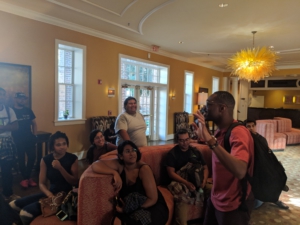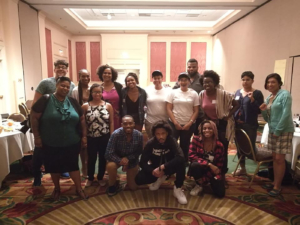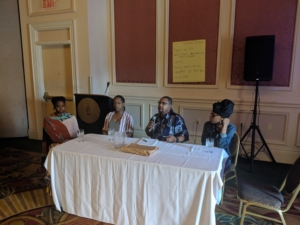 On August 2 through August 5, activists met at the historic Tuskegee University in Tuskegee, Alabama for the Million Hoodies 2018 National Congress. The congress attracted Million Hoodies members and potential members from around the United States. Million Hoodies is an organization that developed in response to the murder of Trayvon Martin. It has been active in bringing together people of color with a desire to make concrete changes in their communities to prevent further acts of hate and other forms of oppression people of color face.
On August 2 through August 5, activists met at the historic Tuskegee University in Tuskegee, Alabama for the Million Hoodies 2018 National Congress. The congress attracted Million Hoodies members and potential members from around the United States. Million Hoodies is an organization that developed in response to the murder of Trayvon Martin. It has been active in bringing together people of color with a desire to make concrete changes in their communities to prevent further acts of hate and other forms of oppression people of color face.
A major goal of this congress was to bring these people together and help arm young organizers with the tools to combat issues in their communities. The four day event brought together people who shared similar values and experiences in order to inspire them to strategize and share ideas to move the movement forward. The days were jam packed with great speakers, workshops, discussions and good food.
The event began at the Kellogg Conference Center & Hotel at Tuskegee University. After a fantastic dinner was served, a film called “Dispatches From Cleveland” was screened. The film focused on the organizing around the horrific killing of Tamir Rice, and the struggle against police brutality. Emphasis was placed on linking that struggle to other issues oppressed communities face in order to strengthen the movement. A central message was that the liberation of the Black community goes hand in hand with the liberation of the trans community specifically.
To further uplift this message, the first day was concluded with a panel featuring guests speakers Samira Rice, mother of Tamir Rice, Dante Berry, executive director of Million Hoodies, and artist Bobby Sessions. The panel was moderated by Elle Hearns, a trans rights activist and co-founder of the Black Lives Matter network.
Hearns made sure to mention that while Prosecutor Timothy McGinty, who refused to hold the police accountable in Rice’s murder, was successfully removed from office, his replacement did not prove to be the change Cleveland needed. Hearns prompted us to think about how we could keep our communities safe outside of elections.
Samira Rice was full of determination as she spoke about continuing the fight for justice for Tamir Rice and other young people like him through the founding of the Tamir Rice Afrocentric Cultural Center. She plans to use the space to mentor Black youth in Cleveland and provide them with opportunities for development.
The panel also highlighted the importance of utilizing media to bring attention to the injustices communities of color are facing. Bobby Sessions expressed that it is an artist’s duty to comment on the world around him. Art is a political act to Sessions and it’s important to draw attention to what’s going on in society through his music. Because of his own experiences with police brutality, raising the voices of the victims of such acts of hate is also a personal endeavor for him.
 Friday kicked off with stories from the field. Million Hoodies chapter representatives spoke about the progress and challenges they face in their local communities and college campuses. The NYC chapter was represented by Paul John and Melissa Manslave, who talked about maintaining ties between alumni activists and Black undergraduates.
Friday kicked off with stories from the field. Million Hoodies chapter representatives spoke about the progress and challenges they face in their local communities and college campuses. The NYC chapter was represented by Paul John and Melissa Manslave, who talked about maintaining ties between alumni activists and Black undergraduates.
Steven Keshishian spoke about the progress the West Florida chapter has made at building a space for people of color to organize and benefit marginalized communities at New College of Florida and in communities surrounding the college. These presentations by students and activists in the struggle helped to inspire other members and show examples of what can happen when organizing with Million Hoodies.
The presentations were followed by a panel of activists focusing on decriminalization, reinvestment, and the Freedom Cities/ Campuses movement. The panel featured organizers Zachary Norris, Daniel Carrillo, Benjamin Ndugga-Kabuye, Paul John, and Charlene Sinclair.
Many key points could be taken away from the informative panel, such as tactics to be mindful of when organizing. It was stressed that it’s important to not leave out populations most affected by the issues we are organizing against. Attention was paid to the movement of safety beyond policing, which calls for divestment in police and then investment in community programs and spaces. Lastly, one could take away from the panel that even if your campaign fails, it still educates people and build awareness.
Later on, Million Hoodies members divided into small groups to hear from activists working on the issues of gun violence and the criminalization of immigrants in their communities. The gun violence session was particularly insightful. The session featured speakers Brittany White and Jacqueline Bediako.
The speakers told stories from their own organizing against gun violence and suggested strategies for Million Hoodies members to employ. They prompted the audience to consider getting elected officials to hear the communities they represent as well as provide those communities with resources and knowledge. They placed value in letting people lead campaigns who were directly impacted by gun violence.
Steps were mentioned that broke down exactly how to go about organizing in a community you’re unfamiliar with. These steps were called the organizing arc: Beginning with deep listening to the people in those communities, bringing someone who knows the community with you, taking notes, identifying commonalities, and building up enough people power to make a difference.
The following day began with another panel focusing on owning campus and municipal power. Speakers Max Rameau, Brittany Williams, Elle Hearns, and Samantha Johnson spoke about what power looked like to them. Elle Hearns described power as something that starts with just one person and maybe a friend. She spoke about how it’s possible to make changes with just a handful of people as long as you’re willing to be committed and put in the work. Max Rameau brought up a concept called community control over policing, which claimed that the only way to end police brutality is to completely abolish policing as we know it and form an alternative structure.
 The rest of the day was filled with presentations about direct action, policy campaigns, base building and information on how to build a campaign step by step. The day concluded with a dance party and entertainment from a local DJ. The Million Hoodies National Congress was a huge success in that it brought together activists from all over the country and built solidarity among them. From the congress, young organizers can take a myriad of tools and approaches toward the struggle for justice to their own communities.
The rest of the day was filled with presentations about direct action, policy campaigns, base building and information on how to build a campaign step by step. The day concluded with a dance party and entertainment from a local DJ. The Million Hoodies National Congress was a huge success in that it brought together activists from all over the country and built solidarity among them. From the congress, young organizers can take a myriad of tools and approaches toward the struggle for justice to their own communities.






